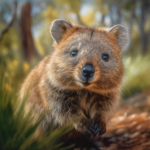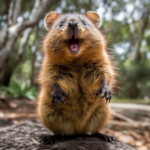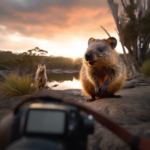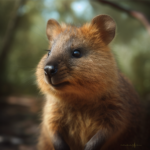Quokkas, those adorable small marsupials native to Western Australia, have captured the hearts of people around the world with their friendly and seemingly smiling faces. But do quokkas actually like humans? This question has intrigued many, as these creatures have gained a reputation for being incredibly sociable and unafraid of human interaction. In this article, we will explore the fascinating world of quokkas and delve into whether they truly have a fondness for humans. So, let’s dive in and discover the truth behind the quokka’s affinity for our species.
Key Takeaways
- Quokkas are known for their friendly and curious nature, which can make them seem to like humans.
- However, it is important to remember that quokkas are wild animals and should not be approached or fed by humans.
- Interacting with quokkas can disrupt their natural behavior and may have negative consequences for their well-being.
- It is best to admire quokkas from a distance and respect their natural habitat.
Understanding Quokkas: An Overview
A. What are Quokkas?
Quokkas are small marsupials that belong to the macropod family, which also includes kangaroos and wallabies. These adorable creatures are native to Western Australia and are known for their friendly and approachable nature. Quokkas have a stocky build, round faces, and short tails, making them resemble a miniature kangaroo. They have coarse fur that ranges in color from brown to gray, with lighter shades on their undersides.
Quokkas are herbivores, primarily feeding on grasses, leaves, and bark. They have specialized teeth that allow them to efficiently chew their food. These marsupials are also known for their ability to survive in harsh environments with limited water sources. They can obtain most of their hydration from the moisture present in the vegetation they consume.
B. Where are Quokkas Found in the World?
Quokkas are endemic to Western Australia, specifically on Rottnest Island and a few other smaller islands in the region. Rottnest Island, located just off the coast of Perth, is the most well-known habitat for these unique creatures. The island’s name actually originated from the Dutch word “Ratnest,” which means “rat’s nest.” The early Dutch explorers mistook the quokkas for large rats due to their size and appearance.
While Rottnest Island is the primary home for quokkas, they can also be found on the mainland in some areas of Western Australia, such as the forests and coastal regions. However, their population on the mainland is significantly smaller compared to the island.
C. Are Quokkas Rare?
Quokkas are considered vulnerable and are listed as a “Near Threatened” species by the International Union for Conservation of Nature (IUCN). The primary reason for their vulnerability is habitat loss and fragmentation due to human activities. As human populations expand and encroach upon their natural habitats, quokkas face increased competition for resources and are at risk of being displaced.
Despite their vulnerability, quokkas have managed to adapt to human presence in certain areas. They have become accustomed to the presence of tourists on Rottnest Island and are known for their friendly interactions with humans. This unique behavior has earned them the reputation of being the “happiest animal on Earth” and has made them popular among visitors.
However, it is important to note that while quokkas may appear friendly, they are still wild animals and should be treated with respect. It is crucial to maintain a safe distance and avoid feeding or touching them, as this can disrupt their natural behavior and potentially harm both the quokkas and humans.
In the next section, we will explore the behavior of quokkas towards humans in more detail.
The Habitat of Quokkas
A. Where Do Quokkas Live in the World?
Quokkas, also known as the “happiest animal on Earth,” are native to Western Australia. Specifically, they can be found on several islands off the coast, including Rottnest Island, Bald Island, and Garden Island. Rottnest Island, located just 18 kilometers from Perth, is the most popular and accessible place to encounter these adorable creatures.
B. The Unique Environment of Quokkas
Quokkas inhabit a variety of habitats, ranging from coastal dunes to dense forests. They are well-adapted to survive in these environments, thanks to their ability to consume a wide range of vegetation. Their diet consists of grasses, leaves, bark, and even small shrubs. This versatility allows them to thrive in different landscapes.
One of the reasons quokkas are so unique is their ability to withstand harsh conditions. They have a high tolerance for heat and can survive in areas with limited water sources. This resilience is essential for their survival, especially in the dry and arid regions they call home.
Quokkas are also known for their ability to swim. They are excellent climbers and can even jump from trees to escape predators. These skills, combined with their agility and speed, make them well-equipped to navigate their natural habitat.
Despite their adaptability, quokkas are primarily found in areas with minimal human interference. This preference for undisturbed environments allows them to maintain their natural behaviors and avoid potential threats. However, their curiosity and lack of fear towards humans have led to increased interactions in certain areas, such as Rottnest Island.
To protect the quokka population and preserve their habitat, it is crucial for visitors to respect the guidelines and regulations set in place. This includes refraining from feeding or touching the quokkas, as human interference can disrupt their natural behaviors and potentially harm them.
In the next section, we will explore the behavior of quokkas towards humans and the impact of human contact on these fascinating creatures.
The Behavior of Quokkas

Quokkas, known for their friendly and approachable nature, exhibit fascinating behavior patterns. Let’s delve into some aspects of their behavior, including how they move, their speed, and how they communicate.
A. How Do Quokkas Move?
Quokkas are small marsupials that primarily move on land. They have adapted to their environment by developing strong hind legs, which allow them to hop with ease. This hopping movement is similar to that of kangaroos, enabling them to cover ground quickly and efficiently.
In addition to hopping, quokkas can also walk and climb trees when necessary. Their nimble movements make them well-suited to their natural habitat, which includes dense vegetation and rocky terrain.
B. Are Quokkas Fast?
While quokkas may not be the fastest animals in the animal kingdom, they can reach speeds of up to 12 miles per hour (20 kilometers per hour). This speed, combined with their agile movements, allows them to navigate their surroundings with relative ease.
Quokkas’ speed is particularly impressive considering their small size. They are about the size of a domestic cat, with an average weight of around 6.6 to 11 pounds (3 to 5 kilograms). Despite their compact stature, they can cover ground quickly when needed.
C. How Do Quokkas Communicate?
Quokkas communicate with each other using a variety of methods. While they do not possess complex vocalizations like some other animals, they rely on body language and facial expressions to convey their intentions and emotions.
One common behavior observed in quokkas is their ability to smile. Quokkas have a naturally upturned mouth, giving them a perpetually cheerful appearance. This “smiling” expression is not necessarily an indicator of happiness but rather a physiological trait.
In addition to their facial expressions, quokkas also communicate through scent marking. They have scent glands located on their chest, which they use to mark their territory and communicate with other quokkas.
Overall, quokkas have a unique and intriguing behavior repertoire. Their ability to move swiftly, their friendly demeanor, and their communication methods make them fascinating creatures to observe and study.
| Quokka Behavior Highlights | |—————————–| | – Quokkas primarily move by hopping, similar to kangaroos. | | – They can reach speeds of up to 12 miles per hour (20 kilometers per hour). | | – Quokkas communicate through body language, facial expressions, and scent marking. |
The Quokka-Human Relationship

A. Do Quokkas Like Humans?
Quokkas, those adorable and photogenic marsupials native to Western Australia, have gained quite a reputation for their friendly and approachable nature. But do quokkas really like humans? The answer is not as straightforward as it may seem.
Quokkas are known for their curious and inquisitive behavior, which often leads them to approach humans. They have a natural curiosity and are not afraid to interact with people. This behavior has earned them the title of “the happiest animal on Earth” and has made them popular among tourists and locals alike.
When encountering humans, quokkas may exhibit behaviors that can be interpreted as liking or enjoying human presence. They may approach people, sniff around, and even pose for selfies. However, it’s important to remember that quokkas are wild animals and their behavior should be respected.
B. Why Are Quokkas So Friendly?
The friendliness of quokkas can be attributed to a combination of factors. Firstly, quokkas have evolved in an environment with little to no natural predators, which has made them less fearful of other animals, including humans. This lack of fear allows them to approach humans without hesitation.
Secondly, quokkas have become accustomed to human presence due to the increasing number of tourists visiting their habitats. Over time, they have learned that humans are not a threat and may even provide them with food scraps. This positive reinforcement has further encouraged their friendly behavior towards humans.
Lastly, quokkas are naturally social animals. They live in small family groups and are used to interacting with each other. This social nature extends to their interactions with humans, as they see them as part of their environment. Quokkas may perceive humans as potential sources of food or companionship, leading to their friendly demeanor.
C. Are Quokkas Scared of Humans?
While quokkas may not be scared of humans, it is important to note that they are still wild animals and should be treated as such. Despite their friendly nature, they should not be approached or handled without caution. It is crucial to respect their boundaries and not invade their personal space.
Quokkas may become scared or stressed if they feel threatened or cornered. Sudden movements, loud noises, or attempts to touch them can cause them distress. It is essential to observe quokkas from a safe distance and allow them to approach on their own terms.
In populated areas where quokkas have regular contact with humans, it is important for both parties to coexist harmoniously. Human impact on quokkas should be minimized to ensure their well-being and preserve their natural behaviors. This includes refraining from feeding them or leaving behind any litter that could harm them.
In conclusion, while quokkas may exhibit friendly behavior towards humans, it is crucial to remember that they are wild animals. Respecting their boundaries and observing them from a safe distance is essential for their well-being and the preservation of their natural habitat. So, if you’re lucky enough to encounter a quokka, enjoy the moment, but always remember to admire them from afar.
The Controversy Surrounding Quokkas as Pets
A. Can Quokkas Be Pets?
Quokkas, with their adorable smiles and friendly demeanor, have gained significant popularity in recent years. As a result, many people have wondered if these cute marsupials can be kept as pets. However, the question of whether quokkas can be pets is a topic of controversy and debate.
Quokkas are native to Rottnest Island in Western Australia, where they are protected by law. They are also found on the mainland, particularly in the southwestern region. While quokkas may appear tame and approachable, it is important to understand that they are wild animals and have specific needs that may not be met in a domestic setting.
One of the main concerns regarding keeping quokkas as pets is their natural behavior. Quokkas are social animals that live in large groups, known as mobs. They have a complex social structure and rely on interactions with other quokkas for their well-being. In a domestic environment, it would be challenging to replicate this social structure and provide the necessary companionship for a quokka.
Another aspect to consider is the diet of quokkas. They are herbivores and primarily feed on a variety of plants, including grasses, leaves, and bark. Providing a suitable diet for a quokka in a home setting can be difficult and may not adequately meet their nutritional needs.
Additionally, quokkas have specific habitat requirements. They thrive in dense vegetation and are adapted to the unique environment of Rottnest Island. Replicating this environment in a home would be extremely challenging and may not provide the necessary space and resources for a quokka to thrive.
B. The Legal and Ethical Implications
Apart from the practical challenges of keeping quokkas as pets, there are also legal and ethical implications to consider. In Western Australia, quokkas are protected by law, and it is illegal to keep them as pets without the appropriate permits. This is to ensure the conservation of the species and protect their natural habitat.
From an ethical standpoint, it is important to prioritize the well-being and conservation of quokkas. Keeping them as pets may disrupt their natural behavior and social structure, leading to stress and potential harm. Quokkas are wild animals that have evolved to live in specific environments, and attempting to domesticate them can have negative consequences for their overall welfare.
Moreover, the increasing popularity of quokkas as pets can fuel the illegal wildlife trade. Unscrupulous individuals may attempt to capture and sell quokkas, leading to their exploitation and endangerment. It is crucial to discourage the demand for quokkas as pets and promote responsible and ethical interactions with these unique creatures.
In conclusion, while quokkas may be incredibly adorable and seem friendly towards humans, they are best appreciated in their natural habitat. Attempting to keep them as pets raises numerous challenges and ethical concerns. It is important to respect their wild nature and contribute to their conservation by observing them responsibly in their natural environment.
The Health Risks Associated with Quokkas
A. Do Quokkas Carry Disease?
Quokkas are generally considered to be harmless and pose minimal health risks to humans. However, like any wild animal, they can potentially carry diseases. It’s important to exercise caution when interacting with quokkas to minimize the risk of contracting any potential illnesses.
While there have been no documented cases of quokkas transmitting diseases to humans, it’s always wise to take certain precautions. Here are a few guidelines to follow when encountering quokkas:
-
Avoid direct contact: Although quokkas may appear friendly and approachable, it’s best to admire them from a safe distance. Avoid touching or handling them, as this reduces the risk of any potential disease transmission.
-
Maintain good hygiene: After being in close proximity to quokkas or their habitat, it’s essential to wash your hands thoroughly with soap and water. This simple practice can help eliminate any potential pathogens that may have been present.
-
Do not feed them human food: Feeding quokkas human food can disrupt their natural diet and may lead to health issues for both the quokkas and humans. Stick to observing and appreciating their natural behavior without interfering.
-
Respect their space: Quokkas are wild animals, and it’s important to remember that they have their own territories and boundaries. Avoid encroaching on their space or disturbing their natural habitat to minimize any potential stress or aggression.
By following these guidelines, you can enjoy observing quokkas in their natural environment while minimizing any potential health risks.
B. Can Quokkas Kill You?
Quokkas are small marsupials known for their friendly and docile nature. They are not known to be aggressive towards humans and are unlikely to cause any harm. However, it’s important to remember that they are still wild animals and should be treated with respect.
Quokkas have been known to defend themselves if they feel threatened or cornered. In such situations, they may scratch or bite in self-defense. While their bites can be painful, they are generally not life-threatening.
It’s crucial to understand that quokkas are protected wildlife in Australia, and it is illegal to harm or kill them. Interacting with quokkas should be done responsibly and with consideration for their well-being.
If you encounter a quokka in the wild, it’s best to maintain a safe distance and observe them from afar. Avoid sudden movements or loud noises that may startle them. Remember, the best way to appreciate these adorable creatures is by respecting their natural behavior and habitat.
In conclusion, while quokkas are generally harmless and pose minimal health risks, it’s important to exercise caution and respect when interacting with them. By following simple guidelines and treating them with care, we can ensure a positive and safe experience for both humans and quokkas alike.
The Lifespan of Quokkas

A. How Long Do Quokkas Live?
Quokkas, also known as the happiest animals on Earth, have a relatively short lifespan compared to other marsupials. On average, these small, herbivorous creatures live for about 10 years in the wild. However, some individuals have been known to live up to 12 years or even longer in captivity.
The lifespan of a quokka is influenced by various factors, including genetics, environmental conditions, and predation. While they may not live as long as some other animals, quokkas make the most of their time by enjoying their natural habitat on Rottnest Island and a few other locations in Western Australia.
B. Factors Affecting the Lifespan of Quokkas
-
Genetics: Like any living organism, the genetic makeup of quokkas plays a significant role in determining their lifespan. Some individuals may be genetically predisposed to live longer, while others may have certain traits that make them more susceptible to diseases or other health issues.
-
Environmental Conditions: Quokkas thrive in a specific type of habitat, characterized by dense vegetation, access to fresh water, and a moderate climate. Changes in their environment, such as habitat loss or degradation, can have a negative impact on their lifespan. Additionally, extreme weather events like droughts or bushfires can further threaten their survival.
-
Predation: Quokkas are preyed upon by a few natural predators, including snakes, birds of prey, and dingoes. These predators can significantly impact the quokka population, especially in areas where their numbers are already limited. Increased predation pressure can lead to a decrease in the average lifespan of quokkas.
-
Human Impact: While quokkas are generally well-adapted to their natural environment, human activities can pose a threat to their survival. Encounters with humans can disrupt their natural behavior and stress them out, potentially leading to health issues. It is crucial for humans to respect the quokkas‘ space and avoid feeding or touching them, as this can have negative consequences for their well-being.
To summarize, the lifespan of quokkas is influenced by a combination of genetic factors, environmental conditions, predation, and human impact. By understanding and addressing these factors, we can help ensure the long-term survival of these adorable and unique creatures. Conclusion
In conclusion, quokkas are known for their friendly and curious nature, which often leads them to approach humans without fear. While it is important to remember that quokkas are wild animals and should be treated with respect and caution, there have been numerous instances where they have shown a liking towards humans. Their natural curiosity and lack of predators on Rottnest Island have likely contributed to their friendly behavior. However, it is crucial to maintain a safe distance and avoid feeding or touching them, as they are still wild animals with their own instincts and behaviors. Overall, the quokka’s affinity for humans has made them popular among tourists and wildlife enthusiasts, and their adorable smiles have earned them the title of the “happiest animal in the world.” So, if you ever have the chance to encounter a quokka, consider yourself lucky and enjoy observing these fascinating creatures from a respectful distance.
Keywords: quokkas, friendly nature, approach humans, wild animals, respect, caution, liking towards humans, curiosity, lack of predators, Rottnest Island, safe distance, feeding, touching, instincts, behaviors, popular among tourists, wildlife enthusiasts, adorable smiles, happiest animal in the world, encounter, observe, fascinating creatures.
Frequently Asked Questions
Where do quokkas live in the world?
Quokkas are native to a small region in Australia, specifically, they are found on some smaller islands off the coast of Western Australia, mainly on Rottnest Island and Bald Island.
How do quokkas move?
Quokkas are capable of climbing trees and shrubs up to 1.5 meters. They move around by hopping, much like kangaroos, using their strong hind legs and large feet.
How do quokkas communicate?
Quokkas communicate through a series of sounds, including hisses, grunts, and barks. They also use body language, such as posturing and facial expressions, to communicate with each other.
Are quokkas rare?
Yes, quokkas are considered to be a vulnerable species due to a decrease in their population. They are protected by conservation laws in Australia.
Do quokkas carry disease?
Quokkas can carry a range of parasites and diseases, which can potentially be transmitted to humans. However, the risk is low and there have been no reported cases of diseases being transmitted from quokkas to humans.
Are quokkas fast?
Quokkas are not particularly fast animals. They move at a moderate pace when hopping and are not known for their speed.
Can quokkas be pets?
No, it is illegal to keep quokkas as pets. They are a protected species in Australia and it is illegal to touch or feed them without a special license.
Why are quokkas so friendly?
Quokkas are known for their friendly and curious nature. They have little fear of humans and will often approach people. This is likely due to a lack of natural predators on the islands where they live.
Are quokkas scared of humans?
Quokkas show little fear of humans, likely due to the lack of natural predators on the islands where they live. However, they are wild animals and should be treated with respect.
How long do quokkas live?
Quokkas have a lifespan of approximately 10 years in the wild. In captivity, they can live up to 14 years.




